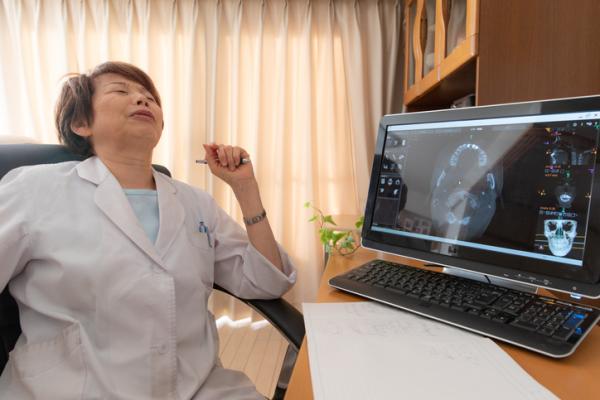
January 11, 2022 — Less-experienced radiologists are more likely to recommend additional imaging for women undergoing breast cancer screening when they read digital breast tomosynthesis (DBT) images later in the day, according to a new study in Radiology. The results highlight how fatigue may affect radiologists differently depending on their experience level.
Previous research has shown that fatigue can adversely affect radiologist performance. Less is known about the impact of fatigue on DBT interpretation, a significant gap in knowledge considering that DBT is on track to replace digital mammography as the gold standard for breast cancer screening in the United States. While DBT offers increased cancer detection and lower recall rates, or the rate that women are brought back for additional imaging based on findings on the initial mammogram, it is more cognitively taxing to the radiologist than digital mammography.
“The standard 2D mammogram is four views,” said study co-author Ana P. Lourenco, M.D., from The Warren Alpert Medical School of Brown University in Providence, Rhode Island. “With DBT, we’re looking at 1-millimeter reconstructions of the breast, which means hundreds of views for each exam.”
Lourenco and two colleagues—experimental psychologist Michael H. Bernstein, Ph.D., and quantitative psychologist Grayson L. Baird, Ph.D., both from the Brown Radiology Human Factors Lab—compared recall and false-positive rates in digital mammography and DBT and their relation to the time of day. They also examined whether radiologist experience affects the potential time-of-day effect.
Drawing from a database of more than 40,000 DBT and 57,000 digital mammography exams performed at 12 offices in Rhode Island, the researchers found that overall recall and false-positive rates were higher for digital mammography than for DBT. The recall rate for digital mammography was 10.2%, compared with 9% for DBT, while the false-positive rate was 9.8% for digital mammography and 8.6% for DBT.
Patients were more likely to be recalled when their DBT screening was interpreted later in the day by less-experienced radiologists. For radiologists with five years or fewer of experience, odds of recall increased 11.5% with every hour when using DBT. There was no evidence of an increase in recall for DBT or for digital mammography for radiologists with more than five years of experience.
“It’s useful to know that fatigue is a factor that impacts performance metrics,” Lourenco said. “As we’re trying to do the best job for our patients and handle increased imaging volumes, these results suggest that regular breaks may have tangible benefits for outcome measures.”
The differences in performance between more- and less-experienced radiologists may be due to different modes of thinking, Dr. Lourenco said. In 2000, psychologists Keith E. Stanovich, Ph.D., and Richard F. West, Ph.D., coined the terms System 1 and System 2 to distinguish between intuitive and conscious reasoning. System 1 thinking operates automatically and quickly, with little or no effort, while System 2 thinking demands more attention.
“It may be that for more experienced radiologists, the effort needed to process things is more of a System 1 phenomenon, whereas less experienced radiologists rely more on System 2 processing, which is more deliberate,” Lourenco said.
Follow-up studies with more radiologists and more specific intervals of experience would be useful in developing strategies to moderate the time-of-day effects, according to Lourenco.
“I hope this study spurs additional research to look at more of the details of what it is that goes on in humans who interpret these images,” she said.
For more information: www.rsna.org
Related Breast Imaging Content:
VIDEO: Use of Breast MRI Screening in Women With Dense Breasts — Interview with Christiane Kuhl, M.D.
Abbreviated MRI Outperforms 3-D Mammograms at Finding Cancer in Dense Breasts
VIDEO: Explaining Dense Breasts — Interview with Christiane Kuhl, M.D.
VIDEO: Use of Breast MRI Improved Cancer Detection in Dense Breasts in Dutch Study — Interview with Gillian Newstead, M.D.
Technologies to Watch in Breast Imaging
Screening MRI Detects BI-RADS 3 Breast Cancer in High-risk Patients
Rapid Breast MRI Screening Improves Cancer Detection in Dense Breasts


 February 18, 2026
February 18, 2026 









